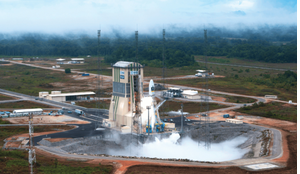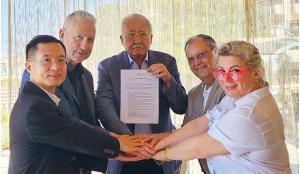States Parties to the Treaty shall bear international responsibility for national activities in outer space, including the Moon and other celestial bodies, whether such activities are carried on by governmental agencies or by non-governmental entities…” – UN Outer Space Treaty, 1967.
In recent years the growing number of actors able to reach into space, both governments and individuals, has given ever-greater importance to this quotation from the Treaty on Principles Governing the Activities of States in the Exploration and Use of Outer Space, including the Moon and Other Celestial Bodies, conventionally known as the Outer Space Treaty.
The Treaty, adopted in 1967 by broad consensus in the UN General Assembly, has become highly relevant as the international space arena changes from being dominated by just the USA and the USSR in the 1950s to the numerous nations and commercial entities now involved in space activities.
The United Nations Office for Outer Space Affairs (UNOOSA), which was established at the beginning of the space age, is facilitating international co-operation in the peaceful uses of outer space among states and international organisations. As the space arena changes, UNOOSA’s role becomes more and more relevant in continuing to promote the peaceful use of space through its programme of activities.
The Outer Space Treaty became the foundation stone of the legal regime governing the use of space for peaceful purposes. It was followed by four more treaties: the ‘Rescue Agreement’ (1968); the ‘Liability Convention’ (1972); the ‘Registration Convention’ (1975); and the ‘Moon Agreement’ (1979).
The treaties are supplemented by five sets of principles and declarations that, although not legally binding, deal with transnational direct television broadcasting via satellites and remote satellite observations of Earth. They also regulate the safe use of nuclear power sources necessary for the exploration and use of outer space. The so-called Benefits Declaration from 1996 focuses specifically on the need to foster international co-operation at all levels, involving a broad range of stakeholders in the space arena.
International co-operation
Within the United Nations, the Committee on the Peaceful Uses of Outer Space (COPUOS) is the primary body for promoting the peaceful use of space for economic, social and scientific development, in particular for the benefit of developing countries. The Committee and its subsidiary bodies, the Scientific and Technical Subcommittee and the Legal Subcommittee, co-ordinate international co-operation in space activities and strengthening coherence and synergy in the international legal regime governing outer space.
The Committee was instrumental in the development of the five space law treaties and the five sets of principles and declarations on outer space. In addition to the treaties and principles, the Committee has recommended resolutions to the General Assembly (subsequently adopted) on defining the concept of the “launching state” (resolution 59/115); on enhancing the practice of registering objects launched into space (resolution 62/101); and on national space legislation (resolution 68/74).
The space arena has seen a massive surge in activity in recent years. The increasing presence of new players and the emerging space capabilities of developing nations, as well as the rise in numbers of private entities, have added new challenges to the legal framework.
Private entities cannot work outside the international framework of space law. Ultimately, states are responsible for the space activities of their nationals as private space activities are subject to authorisation and continuous supervision, as per Article VI of the Outer Space Treaty: “The activities of nongovernmental entities in outer space, including the Moon and other celestial bodies, shall require authorization and continuing supervision by the appropriate State Party to the Treaty”.
COPUOS is regularly appraised by states and international intergovernmental organisations on its efforts towards the exploration and use of outer space and its compliance with the legal framework for space activities. This compliance includes supervision by COPUOS of the activities of non-governmental activities under their jurisdiction.
Despite the newer and more affordable technologies in space, there is still a significant financial investment required to conduct spacebased activities. Inevitably this will mean that a high level of international co-operation is required between states and private entities of various nationalities. International co-operation, conducted through the established mechanisms within COPUOS and under the international legal regime, is paramount in the rapidly changing international space field.
COPUOS remains instrumental as the unique platform at the global level for international cooperation in space. At the heart of its work lies the fundamental need for securing the peaceful use of space for the benefit of all mankind. This is also the mission of UNOOSA.
Private entities cannot work outside the international framework of space law
UNOOSA works towards raising awareness among decision-makers of the benefits of space-based technologies and their applications in addressing societal needs for sustainable development and in strengthening the role of space technologies for the socio-economic development of the Earth, in particular for developing nations.
The Office promotes international co-operation among member states and national and international space-related entities, including the private sector. As the global community moves steadily towards the post-2015 development agenda and the new Sustainable Development Goals, it is paramount for UNOOSA to underline the role of space for development. UNOOSA will continue to stimulate the further advancement of space science and technology and their application for the benefit of all humankind.
The UN Office for Outer Space Affairs (UNOOSA), a United Nations entity with about 30 staff, is based in Vienna, with offices in Bonn and Beijing (for the UN-SPIDER programme). UNOOSA stands at the centre of international efforts to bring the benefits of space technology to meet global development needs and protect and preserve the environment on Earth and in space. Its prime mandate is to serve the Committee on the Peaceful Uses of Outer Space and its Subcommittees.














